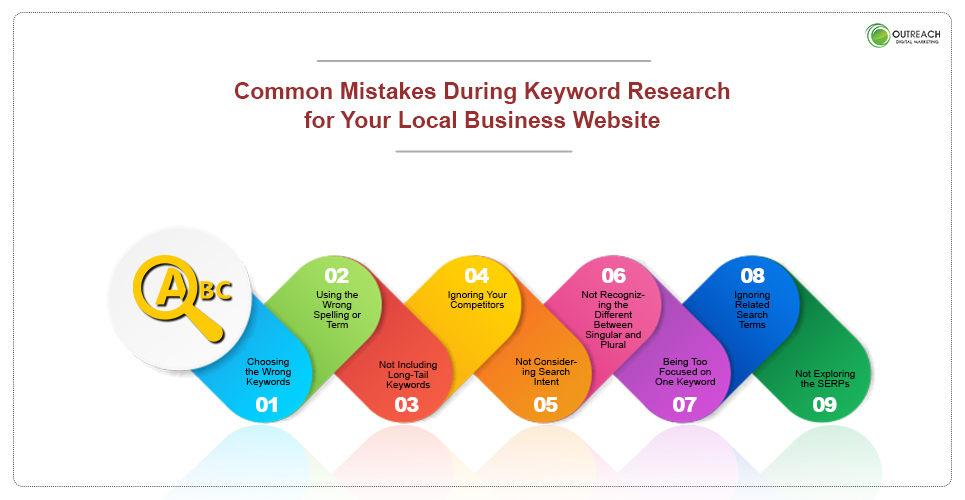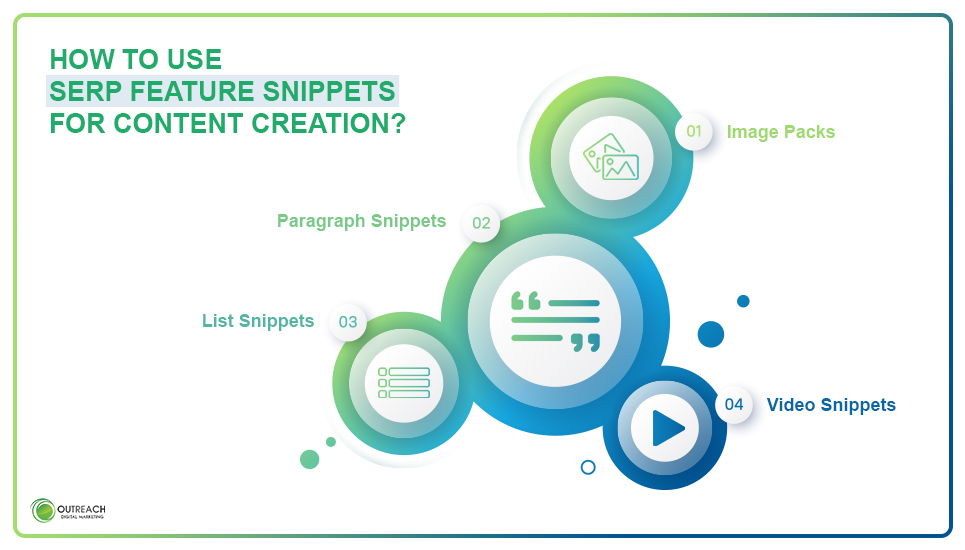Keyword research is important to local business success. Unfortunately, it is also one of the most challenging aspects of your keyword strategy. This is because to rank above the competition, you can’t just focus on broad, common keywords. You also have to determine other less common terms you are most likely to rank for as a smaller, local business. To help make your keyword research easier, here we share the common keyword research mistakes that impact your rankings.

Choosing the Wrong Keywords
Keywords are logical words and phrases your customers are most likely to use for their searches. If you get caught up in the idea you need more keywords, the whole quantity versus quality issue is guaranteed to muddy up the waters. For example, if you sell purses but include the keyword bags in your keywords to extend your reach, you water down your message to search engines with misleading keywords.
Using too broad a term doesn’t drive the right visitors to your site. As a result, you experience a higher bounce rate which means you will reduce your ranking for not just that search term but also other keywords you are using.
Choosing relevant keywords results in happy visitors who find what they expect. They stay on the page longer, are more likely to review other pages on your site, and in turn, send positive messages to search engines. You also attract a higher quality of traffic interested specifically in purses, weeding out the people looking for other types of bags.
Using the Wrong Spelling or Term
There are different proper forms of spelling for keywords. For example, if you want to attract customers in the U.S., you have to use U.S. spelling. A good example is words ending in “or.” If you sell party favors in the U.S. but also include party favours in your keywords, search engines see this as English spelling used in the UK as well as Canada and Australia. This can interfere with local search results. Choosing the right spelling attracts the right searches.
Proper terms go even deeper than this. Different areas use different terms, such as pop versus soda or even Coke versus cola. Focusing on the common terms used in your area ensures your keywords remain relevant for your local searches.
Not Including Long-Tail Keywords
Long-tail keywords refer to phrases consisting of several words. Long-tail key phrases are very important because they tend to see less competition than broader search terms that are short and sweet. Unfortunately, it’s the major brands that tend to rank for those broad terms. As a local business, therefore, it makes more sense to try to rank for more specific, longer-tail keywords instead.
Longer keywords and phrases provide details for specific searches. Three to five words are enough to help narrow down searches so you attract users better suited to your business niche. Longer phrases are more specific with a very positive two-pronged effect:
- It reduces the competition for those keywords and
- It allows you to focus on the specifics of what you offer
As a result, you are more likely to draw attention to your brand and attract a higher quality of traffic to your site. One last benefit of long-tail keywords is that they are better at attracting voice searches. Voice searches tend to pose actual questions with more focused intent. More on intent below.
Ignoring Your Competitors
Have you ever run a search for your keywords to see who ranks at the top? If not, you’re missing out on the opportunity to research the types of keywords your competitors use. Competitive analysis is key to improving your ranking. You can see what the competition is up to and take advantage of their successful keyword strategy using free online tools.
Some tools work by entering a URL to run an analysis on the keywords the competitor uses, while others allow you to enter keywords to show you a list of competitors using them. Analysis is ongoing, using weekly testing to keep you up to date with what the competitors are doing.
Not Considering Search Intent
Search intent refers to the likely purpose a searcher has in mind when they enter a certain query. Search engines are becoming more intuitive to improve user experience, and that includes knowing why a search is made. This ensures the results match the query and provide the best possible results to answer that query, whether it is information, a specific website, or making a purchase.
Search intent types include:
- Informational: The user wants to learn something and answer a basic question, like what are party favors, or when are party favors used.
- Navigational: The user knows what party favors are and wants to find a specific company that sells them, such as Sue’s Party Favors & Events.
- Transactional: The user is now ready to buy party favors.
- Commercial investigation: This user knows what they need to buy but wants more information to decide where they will buy it.
As you can see, these are all very different stages of the buyer’s journey and therefore require very different long-tail keywords.
Not Recognizing the Different Between Singular and Plural
While it seems whether something is singular or plural should have no bearing on a search, there is a distinct difference. Plural refers to more than one item and therefore is ideally used to send someone to a category page, while singular should be used for a specific item and therefore used in the description of a particular product.
For example, party favors would be the category page from which the visitor could select the favor type, such as wedding, birthday party, quinceañera, etc., while party favor would be used to describe a Jordan almond wedding favor. Single is also better suited to services such as party favor design.
Being Too Focused on One Keyword
Including one keyword in all your keyword phrases is certainly an easy solution for small businesses. You just choose the most logical term and use that throughout your site– problem solved. Unfortunately, using one keyword has a number of possible negative effects. First, it smacks of keyword stuffing to search engines because the keyword occurs far too often. Second, you miss out on opportunities to rank for similar keywords that might be less competitive than the main keyword you are using.
There are so many possibilities, it’s worth the extra work to discover different variations. Using varied keywords appears far more natural than using the same word over and over again. The more detailed your keyword research, the more opportunities you’ll find and the more visible you’ll become to search engines.
The other side of the whole one-keyword approach is focusing a specific page’s content around just one keyword. You should always consider your list of keywords and look for opportunities to include them naturally in your content throughout your site. This gives your keywords more legs, so you are more likely to appear across more searches.
Ignoring Related Search Terms
This step is so easy; you can start using it right now. Search your common keywords and scroll to the bottom of the page. There is a box that appears there for every search that lists related search terms. Although you might find the list is similar to keywords you already use, there’s still a good chance you will find some great additions.
Bonus Tip: Not Exploring the SERPs
The search engine results page or SERPs is a font of valuable information. If you tend to ignore them, you miss out on hints provided by SERP feature “snippets.” The snippets can be used to understand the types of content you should create to improve your ranking for each of your keywords:

- Image Packs: If your keywords display images across the top of the SERPs, it means that keyword is more popular with content that is image rich.
- Paragraph Snippets: If the top of the search is a paragraph/short snippet with the answer to a query, you know, including your keyword in a simple sentence that answers a question will increase the odds search engines will choose your content to populate this coveted top position.
- List Snippets: Listicles are common for How to and Top searches. If your keywords show up with a list snippet in the top ranking, this tells you that listed instructions or top 10 content are the most desirable content for this keyword.
- Video Snippets: Video snippets are most common for how-to queries and ensure videos appear at the top of the page. In this case, including an embedded video in your content for those keywords helps your ranking.
Although this isn’t a research mistake per se, it is a mistake you can make when creating content for your keywords. Think of it as a bonus tip.
Understanding common mistakes in local SEO keyword research can help you increase your ranking, create better content, and generate more traffic for your website.
Our professionals will make your keyword research easy and effective. Get in touch with us today!
